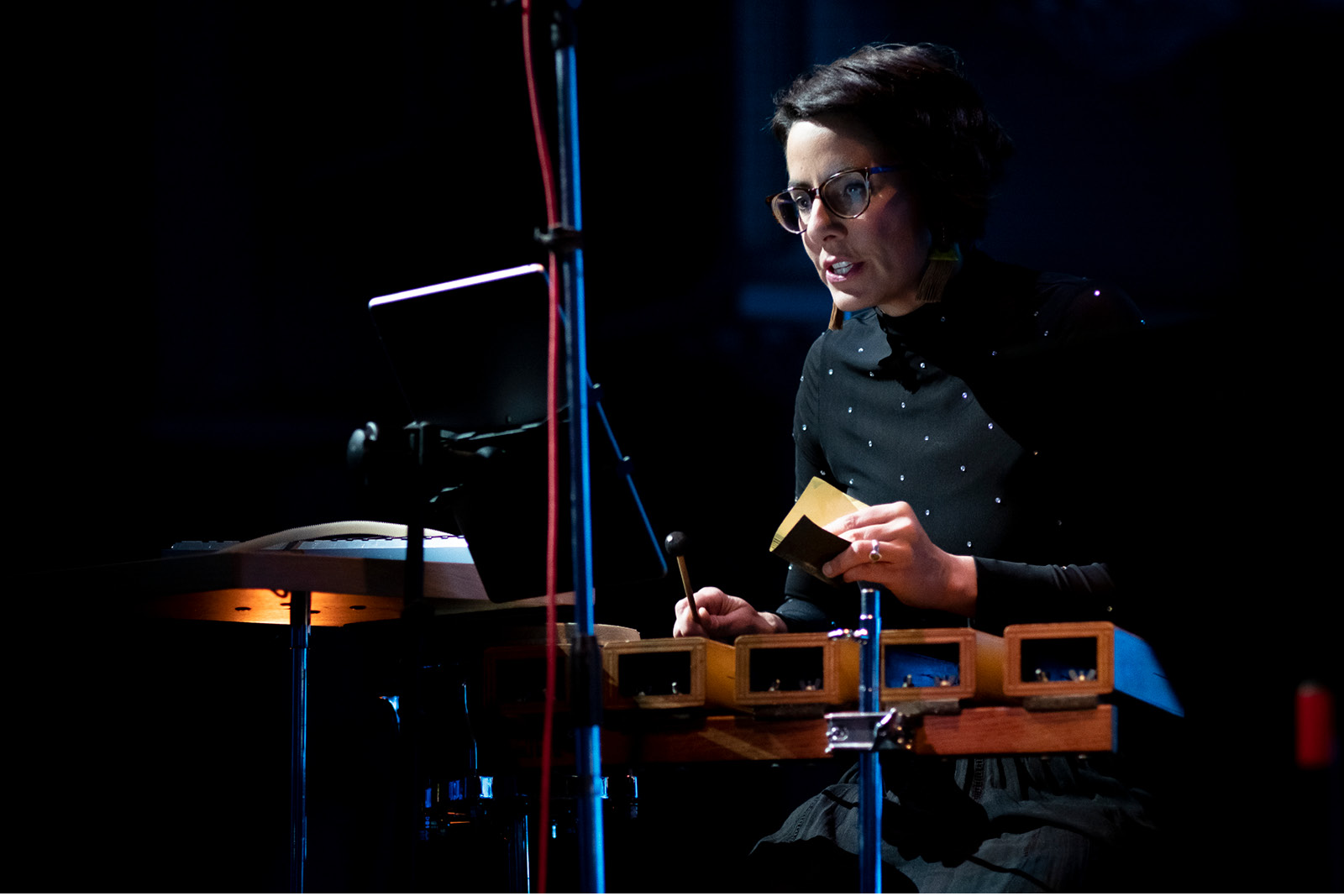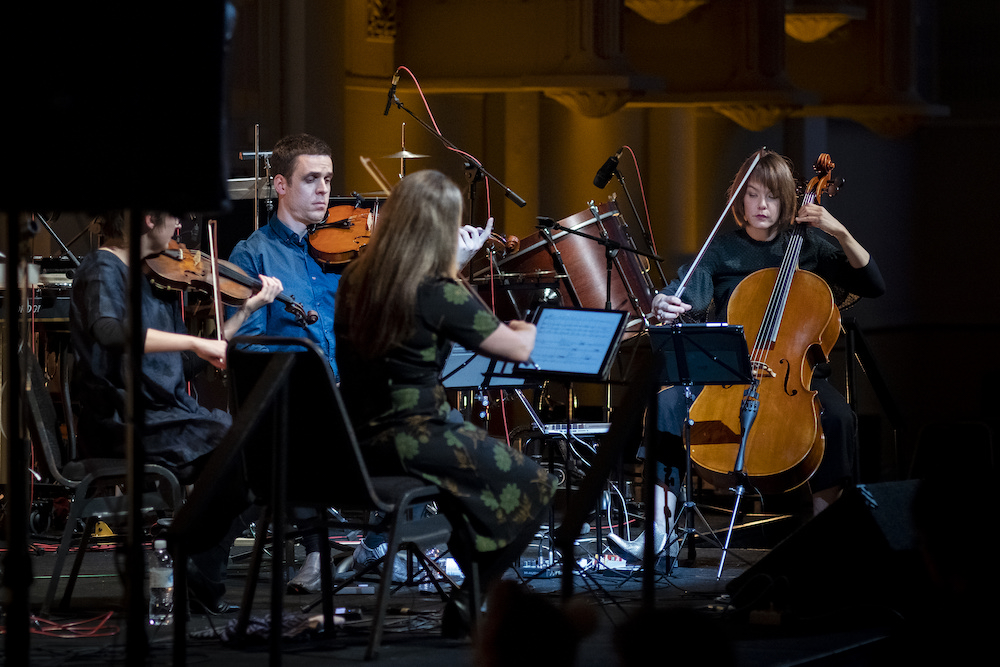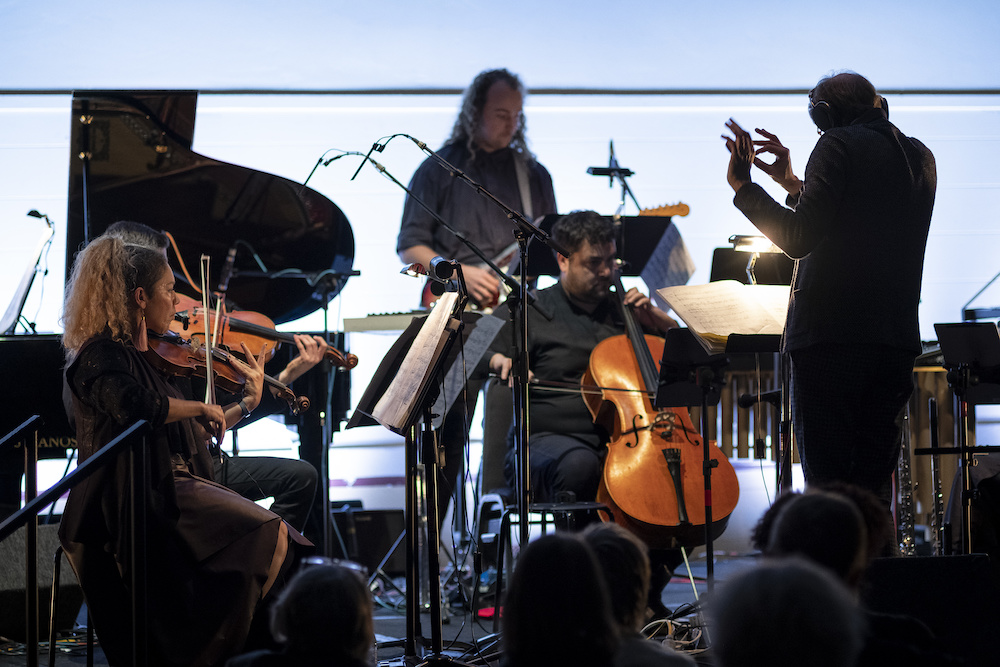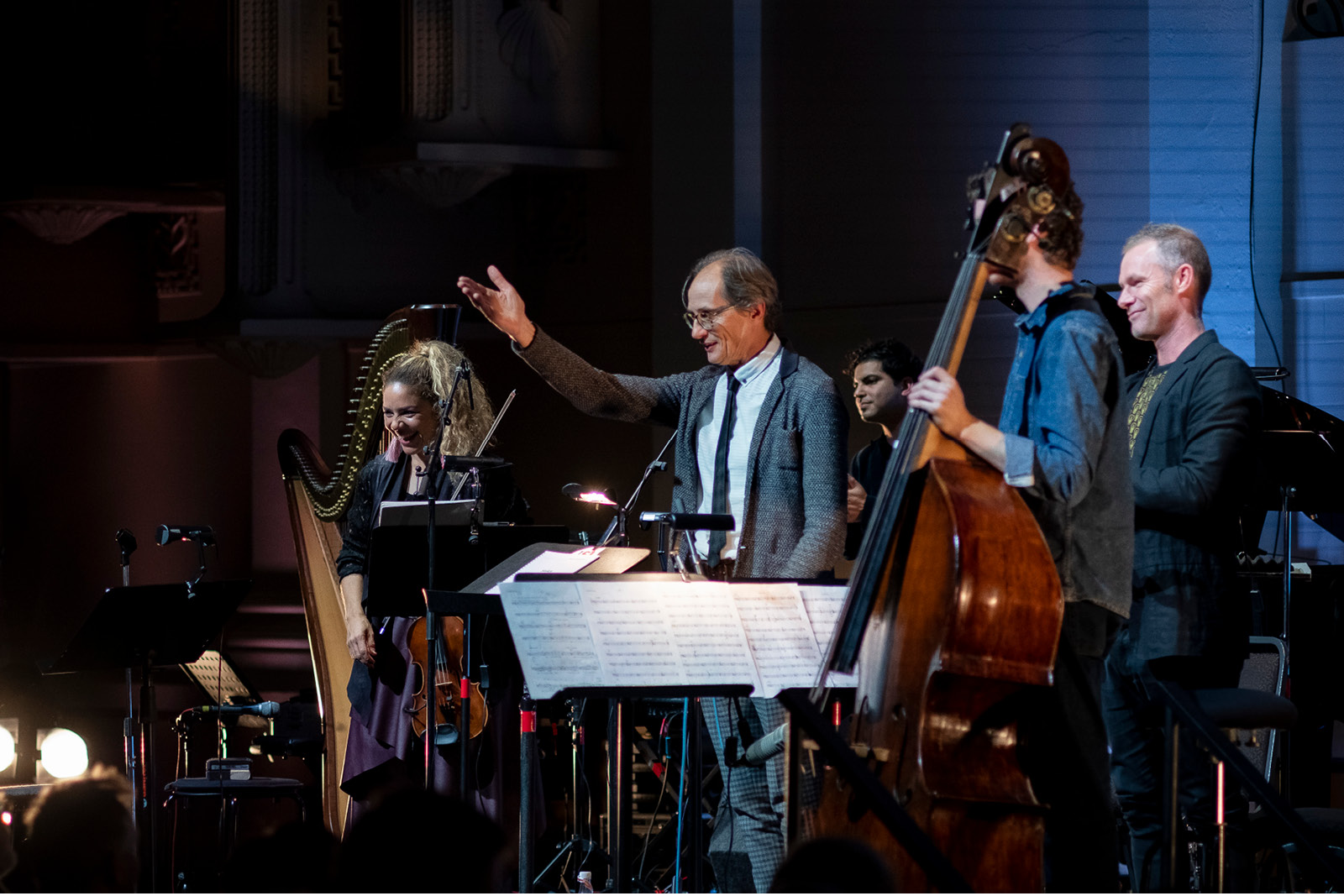It might have been a cold, wet Friday night in Sydney, but the Paddington Town Hall felt cosy as the chiming of Olivia Bettina Davies’ electro-acoustic Femme slid seamlessly into Sungji Hong’s Black Arrow, Jason Noble’s bass clarinet warbling timbral trills against anxious electronics. The evocative pairing kicked off Ensemble Offspring’s micro-festival Kontiki Racket, in its second iteration following a successful debut in 2016, which spanned two days of new music – as well as food, drink, conversation and more.
 Ensemble Offspring Artistic Director Claire Edwardes at Kontiki Racket. Photo © Christopher Hayles
Ensemble Offspring Artistic Director Claire Edwardes at Kontiki Racket. Photo © Christopher Hayles
EO’s Artistic Director Claire Edwardes kicked off the first of six world premieres at the festival with a performance of Canadian star composer Nicole Lizée’s Ribbon Windows A, the first movement of what will be a sister piece to Xenakis’ Rebonds. This was a more intimate work than the Xenakis (or indeed the complex audiovisual works by Lizée that have been performed in Sydney in recent years) with a palette drawing on the susurrus of sand paper against drum skins and temple blocks – alongside stamping “shh” exhalations and melodica – which Edwardes paired with the crisp rhythms and lyrical tremolos of Michael Smetanin’s solo Temple.
The sonic texture shifted with Karen Tanaka’s otherworldly, sensual Song of Songs for cello and electronics – performed by EO’s Blair Harris – soon followed by Zubin Kanga on piano for Missy Mazzoli’s alternately twinkling and brooding Orizzante, before Edwardes and electric guitarist Joe Fallon joined Kanga for the world premiere of Christopher Fox’s new work Iron Rain. Dedicated to the memory of Fox’s wife Sally McNally, who died in December, this music was magical and understated, from the gently employed electric guitar to the chiming of Edwardes’ allophone, which – as in her recent use of the instrument in James MacMillan’s Percussion Concerto – gave the work a reflective, ecclesiastical air amidst the troubling, turbulent sound world.
Friday evening’s second concert was given over to Ensemble Offspring Hatched Academy Associate Artist, violist Henry Justo, who brought a spacious delicacy to Yannis Kyriakides’ Music for Viola, before the inaugural Hatched Academy artist, Callum G’Froerer, gave the premiere of Alice Humphries’ Patience – written during the first six months of her son’s life – for solo double bell trumpet. The unusual instrument was invented to solve the challenge of lightning fast mute changes in new music, and it was this feature that Humphries exploited, with two mutes allowing for distinct voices that at times comingled in warbling effects. One of the highlights of this set was recent Sue W Chamber Music Composition prize winner Samantha Wolf’s incredibly tactile new trio Simmer – for which G’Froerer (now on single bell trumpet) was joined by Justo and percussionist Niki Johnson – which explored the threshold between pitch and noise. Justo and Johnson capped off the evening with a stunning performance of Berio’s Naturale for viola, percussion and electronics, infused with the folk-music of Sicily.
 The Zephyr Quartet at Kontiki Racket. Photo © Christopher Hayles
The Zephyr Quartet at Kontiki Racket. Photo © Christopher Hayles
Saturday’s festivities began with a guest ensemble, the Zephyr Quartet from Adelaide. Opening with the world premiere of Brendan Woithe’s ambient Breath, the composer himself on electronics, Zephyr’s set included a hypnotic performance of Cat Hope’s Wall Drawing (performed from a graphic score app inspired by the work of Sol LeWitt) with the ensemble joined by Ollie Brown on electronics and Woithe tracing sinuous arcs on Theremin; a powerful performance by cellist Hilary Kleinig of Lisa Cheney’s When We Speak, which saw Finnish composer Kaija Saariaho’s words on gender equality mingling with cello and accumulating into a crowd of voices; the bright, repeating motifs of Anna Meredith’s Music for Ravens (in an Australian premiere); the world premiere of a new work by Kleinig, Exquisite Peace, a work of meditative warmth; and finally Caroline Shaw’s delightful Valencia, named for the oranges, which captured the glistening details of the fruit’s vesicles in high strings and juicy pizzicatos.
 Roland Peelman conducting Ensemble Offspring at Kontiki Racket. Photo © Christopher Hayles
Roland Peelman conducting Ensemble Offspring at Kontiki Racket. Photo © Christopher Hayles
Roland Peelman joined Ensemble Offspring onstage to conduct the final concert of the festival, which opened with the Australian premiere of Nicole Murphy’s Stolen, written for Yale University’s 2014 Norfolk Chamber Music Festival and based on Richard James Allen’s poem A Scheme for Brightness. Murphy built up a luminous sound world, electric guitar joining an insistent pulse and splashes of colour from Kanga’s piano, bongo and bass clarinet driving the work’s rhythmic section. Saariaho’s Lichtbogen was the glimmering heart of this set, the Finnish composer’s early hit inspired by the Northern Lights and drawing on Spectral music given a lithe, ethereal performance here before the festival came to a close with a muscular rendition of Fausto Romitelli’s wild Professor Bad Trip Lesson 1 that saw each of the musicians extinguish their lights one by one against the sinking bass of the final bars, à la Haydn’s Farewell.
Kontiki Racket wasn’t just these four mainstage performances, however, with food and drink contributing to the warm atmosphere in the Town Hall, and the Kontiki Bazaar offering a CD and sheet music swap, lessons on musical saws (and at one point Theremin) and an instrument petting zoo. The festival also included a panel discussion on women’s representation in programming and leadership roles (here Edwardes and EO very much walked the walk, with 14 of the 20 composers programmed in the festival women) and the launch of the second CD in the ensemble’s Offspring Bites series.
 Roland Peelman and Ensemble Offspring. Photo © Christopher Hayles
Roland Peelman and Ensemble Offspring. Photo © Christopher Hayles
Ensemble Offspring doesn’t shy away from music that can be challenging for both players and audience, but if die-hard new music enthusiasts might have longed for one or two large-scale works – Berio’s Naturale was the only piece to hit the 20-minute mark – this festival was no less satisfying for being digestible, with uniformly high-quality performances and clever programming showcasing not just the innovation and varied voices on offer, but also the sheer pleasure of hearing new music for the first time.











Comments
Log in to join the conversation.